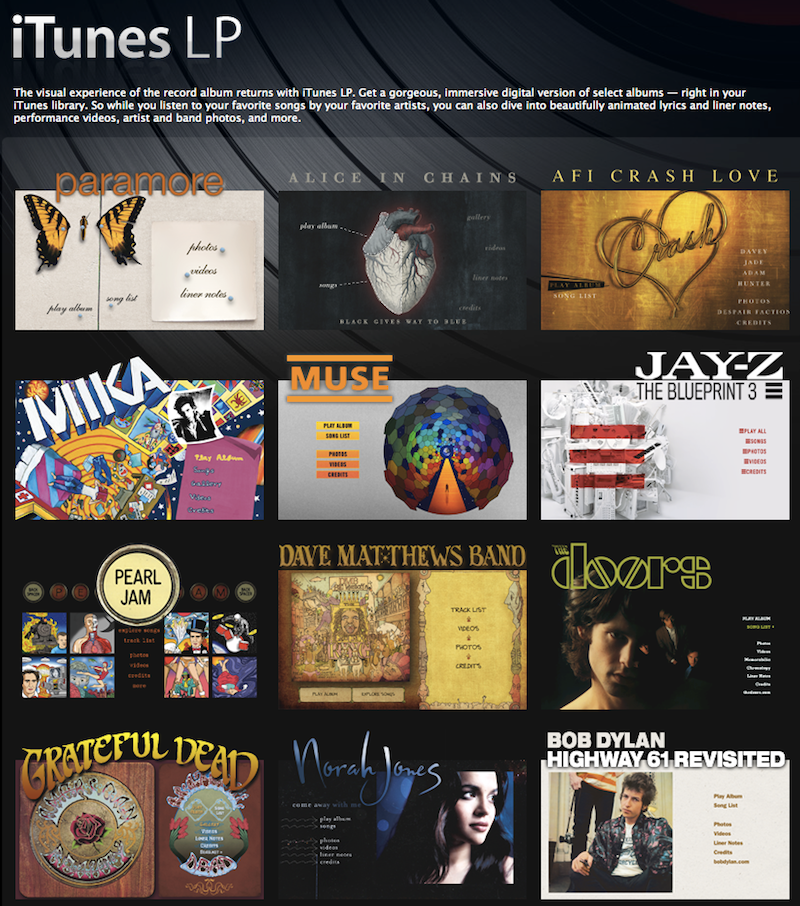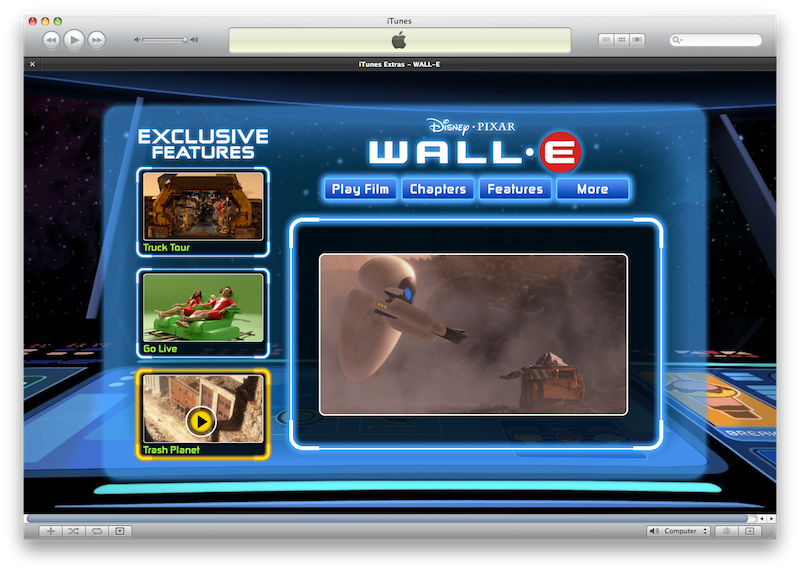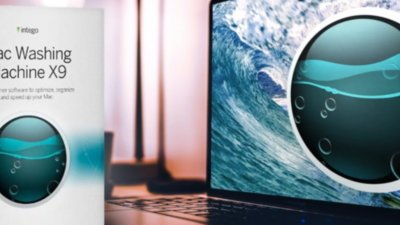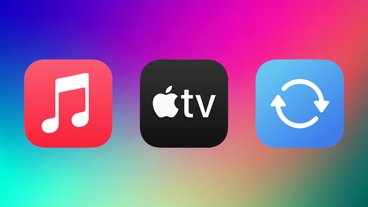Apple criticized over iTunes LP development costs
A report by Gizmodo cited Brian McKinney of Chocolate Lab Records, a small label representing three albums and an EP from four artists. McKinney said he expressed interest in creating iTunes LP versions of his acts' work, but was shot down by an iTunes representative discussing the subject with his distributor at the Independent Online Distribution Alliance.
IODA is a group in San Francisco which helps indie acts get distributed through online sites including iTunes and Amazon as well as through mobile carrier stores such as operated by Sprint, Nokia, and Verizon. The iTunes rep reportedly said that Apple was charging a $10,000 production fee to develop the new interactive digital album titles, that there were only a dozen iTunes LP works being offered right now, and that the company wasn't even offering the treatment to the broader indie market.
Gizmodo described the development costs as "ridiculous, prohibitive fees" and charged that Apple was catering only to the acts "that iTunes needs to keep happy to be a viable music store, not the ones that might actually make something artistically interesting."
There's an app for that
At the same time however, Apple already has a platform that it has opened wide to indie labels of all stripes: the iPhone App Store. Any artist can build a custom app delivering whatever artistically interesting content they can imagine into existence, and can even set a small price for it in order to cover their expenses, or perhaps even turn a profit.
If they lack the skills and resources to develop or commission an iPhone app in order to reach the installed base of Apple's 50 million mobile users, there's always the web. Anyone with a book on HTML and Apple's free iPhone development guidelines can build their own mobile-savvy website targeting Apple's vast and growing base of web-enabled iPod and iPhone users, and promote their site via MySpace or FaceBook without Apple's involvement at all.
If anything, it appears that Apple's represented policy on iTunes LP production is a response to criticisms of the App Store. Despite leading the world in mobile applications with a library now approaching 90,000 apps (even as the company also dumps hundreds of shovelware apps at a time in its efforts to cull scandalous developers from its ranks), the App Store is often derided for accommodating "flashlight and fart apps" of little value.
Conversely, Apple was also roundly criticized for originally blocking apps that fell in the fart category, in its attempts to set a professional tone for its new mobile software store. It's really hard to imagine any possible strategy that the company could have pursued to avoid vitriolic castigation from its usual critics, so the unbuttoned disgust being expressed over the iTunes LP issue isn't really a surprise.
Apple's iTunes LP strategy
The fact that Apple uses open, web standards to build its new iTunes LP titles, and the fact that they are currently only viewable within iTunes 9 on a Mac or PC, along with the expectation that these digital albums are being targeted at a new tablet form factor product in the pipeline as well as the HDTV resolution of Apple TV, all serve as indicators that iTunes LP is a work in progress that is still unfolding as a strategy.
Until Apple unveils Apple TV 3.0 support for the new albums (and their nearly identical iTunes Extra interactive bonus content packages for digital movies) and ships the new tablet that is expected to serve as an interactive browser for all kinds of digital content, including new media magazines and newspapers, this is still something that's brewing in Apple's labs.
With only a dozen titles currently available, Apple likely doesn't want the new format associated with music the mainstream market doesn't care about. Having to manage quality assurance for a thousand self-made indie titles would distract Apple's iTunes group from being able to promote the stature of huge pop acts it currently has in its iTunes LP roster: Norah Jones, the Doors, Perl Jam, Mika, Grateful Dead, and of course Steve Jobs' favorite: Bob Dylan.
A look at the movies available with iTunes Extras also shows some discrimination: Iron Man, Batman Begins, Wizard of Oz, Da Vinci Code, Quantum of Solace and of course Steve Jobs' favorite: Pixar's WallE (below). That's not to say Apple has exceptionally lofty standards; they also gave the Extras treatment to Talladega Nights and some movie with Matthew McConaughey in it.
But clearly, Apple wants to debut iTunes LP and Extras with as much class as possible. The company now has the stature to do just that, after being forced to endure a more humble entry into TV programming just four years ago with one partner (Disney/ABC) and a library of only five series, one of which was "That's So Raven," not likely a favorite of Steve Jobs.
Ten Thousand is Cheap
As for the production costs associated with iTunes LP titles, if the $10,000 figure cited is true, it's hard to imagine how Apple is cranking these out for so little. Authoring any sort of interactive content is expensive. Try to some hire expert designers in Silicon Valley do do your website for $10,000 and you might get laughed at derisively. iTunes LP, as AppleInsider was among the first to report, is essentially a self-contained web application.
What's the alternative? For indies wanting to author a Blu-Ray disc, they'll first have to come up with around $3,500 to print their content to disc by a service bureau in 1000-disc quantities, plus per-title fee of $1,585 to license the use of Blu-Ray's non-negotiably mandatory AACS DRM. You can also buy a $3,000 BR burner and try burning your own discs, but BR-RW currently doesn't work reliably across the BR players in existence and the media is still so expensive that duplication costs about as much as outsourcing it to pros.
But wait, that's all just fees associated with duplication and licensing. If you actually want to author interactive Blu-Ray content, it'll cost you around $40,000 to obtain just the authoring software needed to create the content yourself. If you want pros to develop it for you, you'll probably need a well-funded label that thinks you have a big hit.
Of course, these fees are helping to create the dismal market for Blu-Ray. One can also author DVDs for cheaper, or develop Flash or other custom apps or web sites that add some extra bonus content to standard CDs. But it has always been fantastically expensive to author content.
Many efforts over the years to launch a format for authored content have never really taken off, from Apple's early attempts to promote QuickTime content on CD-ROMs to CD+Graphics, Mega-LD, Video CD, Philips/3DO CDi, Commodore's CDTV, Super Audio CD, DVD-Audio, and Sony's PSP UMDs.
If Apple can develop a viable format using open standards that users will pay for, or will at least encourage them to buy digital downloads containing interactive bonus content at a faster clip than they already are, then the $10,000 it costs to develop the titles will really be an exceptionally cheap onramp for the labels and studios who are still somewhat hesitant about merging into the digital highway.
Frosting for iTunes' cake
Complaining about an authoring production fee that has got to be among the lowest in the industry is on par with the outrage some expressed when they found out that App Store developers would need to pay $99 for a software signing certificate and would need to buy a Mac to use the iPhone's development tools.
At the same time, once Apple fully engages its iTunes LP plans, it's likely that the company will rely on third parties to actually develop the titles. It has a library of six billion songs and thousands of movies; even if LP/Extras treatment is applied very selectively, that's an awful lot of potential authoring for one company to take on.
Apple's choice of using web standards to build the content, rather than building it as a proprietary app in the model of iPhone software, indicates that wants to set the development bar on iTunes bonus content low enough to attract the broad and deep talent that already exists among the world's web developers.
Additionally, since these bonus content packages are just a secondary file that Apple distributes upon the purchase of a standard movie or album of tracks, with no mandatory DRM like Blu-Ray nor any special technology licensing nor any SDK requirements like those related to iPhone apps, there's no reason that third parties can't develop their own material and distribute it independently of iTunes. All that's required is some simple documentation of Apple's TuneKit features for interactively playing music or video in iTunes from the self contained web applications.
Given that the bonus content all created in JavaScript and largely self-documented, it's puzzling why there's not yet an online repository for users and indies interested in creating their own bonus content. After all, Apple is clearly signaling here that it wants to create an open interactive content format that will add value to its already non-profit/self-sustaining efforts to deliver music and video in iTunes for Mac, iPod, and iPhone users.
 Prince McLean
Prince McLean












 Malcolm Owen
Malcolm Owen
 William Gallagher
William Gallagher

 Sponsored Content
Sponsored Content



 Christine McKee
Christine McKee







